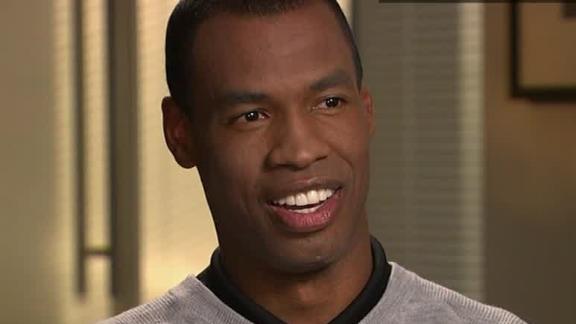“In you God’s love is revealed,” the USCCB wrote of gay people. Vague, no? Couldn’t you say that about any person? What does that actually mean? Well, this week’s given me some idea.
The NBA might not be the place we look to for unconditional love. But when Jason Collins bravely confessed in Sports Illustrated on Monday, “I’m a 34-year-old NBA center. I’m black. And I’m gay,” the responses from the League moved me. When a person comes out, they’re asking society to recognize that they know and accept themselves. At the heart of the church’s teaching is the fact that God already knows, accepts, and loves us, without us having to ask for it all. Apparently even the otherwise-evil Commissioner Stern isn’t immune to such revelations:
“As Adam Silver and I said to Jason, we have known the Collins family since Jason and Jarron joined the NBA in 2001 (2/4)
— NBA (@NBA) April 29, 2013
and they have been exemplary members of the NBA family. Jason has been a widely respected player and teammate throughout (3/4) — NBA (@NBA) April 29, 2013
his career and we are proud he has assumed the leadership mantle on this very important issue.” #NBAFamily (4/4) — NBA (@NBA) April 29, 2013
Even the less-than-charming, Twitter-dominating, Black Mamba weighed in:
Proud of @jasoncollins34. Don’t suffocate who u r because of the ignorance of others #courage #support #mambaarmystandup #BYOU — Kobe Bryant (@kobebryant) April 29, 2013
Collins’s choice is giving others the opportunity to reflect God’s love through their unconditional acceptance:
I am so proud of my bro @jasoncollins34 for being real. #FTheHaters bit.ly/12J9el5
— Baron Davis (@Baron_Davis) April 29, 2013
Second-best-player-in-the-NBA Kevin Durant sums up the sentiment: “As NBA players,” he commented, “it’s like a big group of guys, kind of like a brotherhood.”
Collins even claims that Tim “Gay-people-shouldn’t-be-in-the-world” Hardaway called him Monday night to express his support. It might be easy to hate a category, but when it’s your brother – when it’s family – for the repentant Hardaway (and, I imagine, many of us) it’s love that matters most.
All this was on the front of my mind when I tuned into the Colbert Report on Wednesday night. To my pleasant surprise, my Seattle homeboy Macklemore performed. More surprise: It wasn’t record-setting chart-topper ‘Thrift Shop’ or follow-up #1 single ‘Can’t Hold Us’ that he played. No – he performed ‘Same Love.’ NPR’s Bob Boilen described the song this way:
The first time I heard “Same Love,” it brought tears to the eyes of a roomful of people, myself included. The song is about equality, specifically gay rights, with an unambiguous message: “It’s human rights for everybody / There is no difference.”
“Word,” the US Bishops might have commented on Macklemore’s lyric, were they fluent in the hip-hop vernacular. Since they’re not, here’s what their Excellencies did say:
“The teachings of the Church make it clear that the fundamental human rights of homosexual persons must be defended and that all of us must strive to eliminate any forms of injustice, oppression, or violence against them.”
Macklemore, in his compelling musical way, would concur. Check out the performance to which the All-Songs-Considered-host refers:
What makes this stuff powerful?
My heart hears brothers caring for brothers. Kobe & Co. tell me that we’re children of God, that that makes us family and – because of that and nothing more – we’re all worthy of love. In the context of one of today’s more controversial issues, Misters Collins and Macklemore give us the opportunity to call that irresistible fact back to mind.



